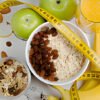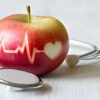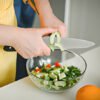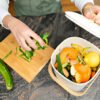No food is too bad or too empty of nutrition to eat as an occasional treat. Foods you eat very occasionally have almost no impact on your health or weight. It’s the food we eat every day that counts. Here is a short guide to some foods that can cause problems during menopause.
Higher Sodium Foods
Salty or high-sodium foods are not helpful or necessary in any healthy menopause eating plan. So restrict your intake of foods like: processed frozen entrees and processed cold cuts, canned soups, regular stock or bouillion, foods canned in salted water, salted nuts, ketchups, package sauce mixes, processed cheese, margarine, butter and salted nuts. Instead, use lemon juice, chili sauce, ginger, garlic or fresh herbs for flavor in place of sodium.
Saturated Fats
Saturated fat in meats, full-fat dairy foods, and other animal products is unhealthy for everyone, especially women in menopause. So reduce your intake of animal foods and choose lean meats and low-fat dairy. In addition, restrict your intake of margarine and processed baked foods like cookies, as these foods can be high in “trans-fats” or “hydrogenated” fats – both of which are saturated fats.
Heart Disease After Menopause
Before the menopause, estrogen protects women from some of the effects of a high fat diet. This is why rates of heart disease are lower in premenopausal women than men of similar age. But during the menopausal and postmenopausal stages, estrogen levels decline. This leads to a fall in the level of HDL cholesterol (the good blood fat) and a rise in LDL cholesterol (the bad fat). Which is why rates of heart disease among menopausal and postmenopausal women are as high as those among men of similar age.
Drink Alcohol in Moderate Amounts
Drinking a glass of wine every evening is good for your health. But more is not better: it can be quite unhealthy and may aggravate some symptoms of menopause. Instead, drink mineral/bottled water, diluted fruit juice including calcium-fortified juice, vegetable juice, fat-free milk, calcium-fortified soy milk, herbal teas like fennel and green tea.
Avoid Highly Spiced Foods
Spicey foods such as hot curry, hot chili dishes, can make hot flashes worse. So go easy on highly flavored meals.
Caffeine
Most experts say reduce your intake of caffeine (from coffee, tea and soft drinks). They are probably right since too much caffeine can cause loss of calcium, although I see nothing wrong with a few cups of regular strength coffee. Coffee is a great tonic in many situations. Tea can also be a great comfort, and green tea is packed with healthy ingredients. So my advice is: if you enjoy coffee or tea, then continue drinking it – but don’t overdo it.









